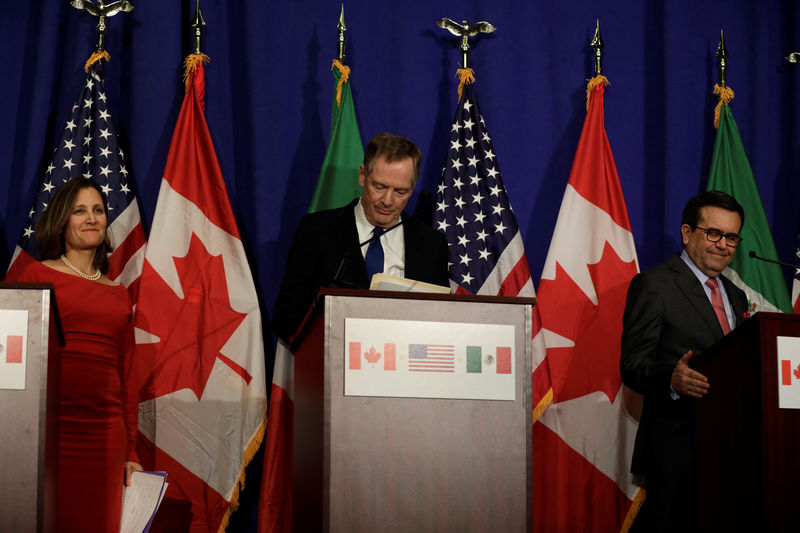(Bloomberg) -- The rules governing the use of steel and aluminum in cars have emerged as the latest obstacle to completing a revised Nafta deal between the U.S., Mexico and Canada in time for congressional approval by year end.
The three nations are discussing the fine print of the agreement that requires 70% of steel and aluminum in vehicles to come from the continent in order to receive duty-free treatment, according to half a dozen people familiar with the talks, who asked not to be named because they’re private. Mexico and the U.S. administration are seeking to agree on changes to the text as early as Friday before presenting a proposal to House Democrats.
Last week the U.S. put on the table a demand to count only steel and aluminum slab toward the 70% threshold that originate in North America, the people said. That would complicate qualification for cars produced in Mexico, whose slabs often originate in Brazil, Japan and Germany. The proposal was floated as a demand from the United Steelworkers union last year, according to two of the people.
On Monday, President Donald Trump announced plans to reinstate tariffs on steel and aluminum from Brazil and Argentina, nations he accused of devaluing their currencies to the detriment of U.S farmers.
Rules for cars are at the heart of Trump’s bid to replace the North American Free Trade Agreement with the so-called U.S.-Mexico-Canada Agreement, or USMCA, that gives more incentive to manufacture in the U.S. They were among the most difficult and painstaking issues to resolve in the negotiations last year.
“The USMCA rule of origin is challenging to comply with, but we can meet this additional requirement,” said Matt Blunt, President of the American Automotive Policy Council which represents the Big Three U.S. Automakers. “Passage of USMCA remains our highest priority.”
Worker Protections
The countries are now pushing for Congress to approve the deal before the 2020 presidential campaign dominates the agenda. But the demand by Democrats, who control the House, for greater protections for Mexican workers, is also holding up its progress.
House Speaker Nancy Pelosi said Thursday evening on CNN that she remains “optimistic“ that the USMCA can be completed. But she added it will only be brought for a House vote when there are strong enforcement provisions in the text.
On labor issues, Mexico’s chief negotiator, Jesus Seade, said on Wednesday that there are still details to work out, but that bringing in U.S. inspectors to monitor Mexican companies is unacceptable and off the table. Seade returned to U.S. Trade Representative Robert Lighthizer’s office for more talks on Friday morning.
A letter from Mexico’s industrial chamber known as Concamin sent to Seade on Wednesday and obtained by Bloomberg News said that the changes the U.S. is seeking on steel and aluminum are unacceptable and impossible for the nation’s automakers, would threaten their competitiveness and destroy two decades of supply chain integration.
If the USMCA deal isn’t passed by Congress, then Nafta would remain in place. But that runs the risk of Trump, who has frequently criticized the 1994 agreement, attempting to withdraw the U.S., as he threatened to do in the past. That could wreak chaos on the highly integrated regional economy and annual trade of more than $1 trillion.
